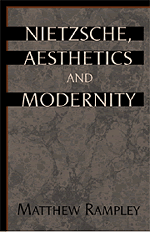Book contents
- Frontmatter
- Contents
- List of Abbreviations
- Acknowledgements
- Introduction
- 1 Truth, Interpretation and the Dialectic of Nihilism
- 2 Nietzsche's Subject: Retrieving the Repressed
- 3 Laughter and Sublimity: Reading The Birth of Tragedy
- 4 Wagner, Modernity and the Problem of Transcendence
- 5 Memory, History and Eternal Recurrence: The Aesthetics of Time
- 6 Towards a Physiological Aesthetic
- 7 Art, Truth and Woman: The Raging Discordance
- 8 Overcoming Nihilism: Art, Modernity and Beyond
- Notes
- References
- Index
5 - Memory, History and Eternal Recurrence: The Aesthetics of Time
Published online by Cambridge University Press: 18 March 2010
- Frontmatter
- Contents
- List of Abbreviations
- Acknowledgements
- Introduction
- 1 Truth, Interpretation and the Dialectic of Nihilism
- 2 Nietzsche's Subject: Retrieving the Repressed
- 3 Laughter and Sublimity: Reading The Birth of Tragedy
- 4 Wagner, Modernity and the Problem of Transcendence
- 5 Memory, History and Eternal Recurrence: The Aesthetics of Time
- 6 Towards a Physiological Aesthetic
- 7 Art, Truth and Woman: The Raging Discordance
- 8 Overcoming Nihilism: Art, Modernity and Beyond
- Notes
- References
- Index
Summary
Only if history can endure to be transformed into a work of art will it perhaps be able to preserve instincts or even evoke them.
(UM II §7)The question of time and history constitute central elements in Nietzsche's thinking. It is well known, for example, that one of his more substantial charges against metaphysics is that the philosophical faith in logical categories leads to a petrifaction of life. The vital flux of becoming is devalued, and, instead, notions of being, stability, in short, timelessness, are valued more highly. Such a desire for stability and unity results from a ‘need for inertia’ (WP §600), whereas the ability to accept ambiguity, constant change and the ‘reversal of customary perspectives’ (OGM III §12) constitutes a 'sign of strength' (WP §600). One of the principal causes of this process is a mis-recognition of what and how the vocabulary of logic, and language in general, signifies. The crucial error of metaphysics is to have assumed that language refers to a pre-existing real, awaiting the correct term to be applied to it, a critique I outlined in the first chapter. This reification and hypostatisation of language necessarily bequeaths a certain conception of time in its wake. The faith in the certainties of grammar necessarily restricts a priori what can be considered to be an existent, and even what it means to exist. For Nietzsche the problem can be traced back to Socrates, whose apparently innocuous search for definitions, originally a problem of semantics, is transformed by Plato into one of ontology.
- Type
- Chapter
- Information
- Nietzsche, Aesthetics and Modernity , pp. 135 - 165Publisher: Cambridge University PressPrint publication year: 1999



